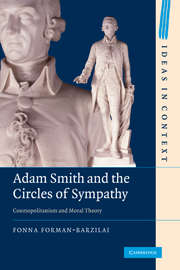Book contents
- Frontmatter
- Contents
- Acknowledgments
- Introduction: Smith's oikeiōsis
- PART I THE CIRCLE OF THE SELF
- PART II THE CIRCLE OF SOCIETY
- 3 Discipline and the socialized conscience
- 4 Perfectionism and social order
- PART III THE CIRCLE OF HUMANITY
- Conclusion: cultural pluralism, moral goods, and the “laws of nations”
- Bibliography
- Index
- IDEAS IN CONTEXT
4 - Perfectionism and social order
Published online by Cambridge University Press: 03 May 2010
- Frontmatter
- Contents
- Acknowledgments
- Introduction: Smith's oikeiōsis
- PART I THE CIRCLE OF THE SELF
- PART II THE CIRCLE OF SOCIETY
- 3 Discipline and the socialized conscience
- 4 Perfectionism and social order
- PART III THE CIRCLE OF HUMANITY
- Conclusion: cultural pluralism, moral goods, and the “laws of nations”
- Bibliography
- Index
- IDEAS IN CONTEXT
Summary
[A]lmost all worthwhile human life lies between the extremes that morality puts before us.
Bernard Williams, Ethics and the Limits of PhilosophySmith's portraits in the last chapter of the “weak man” and the “wise and virtuous man” are ideal types. Most people fall somewhere in the middle. Like Cicero's De Officiis, which Smith characterized as a doctrine of “imperfect, but attainable virtues,” the Moral Sentiments seeks to describe the morality of ordinary people, to whom Smith variously referred as “tolerably good soldiers,” “commonly honest men,” the “mean,” the “many,” the “greater part,” the “crude,” the “mass,” the “vulgar,” the “coarse clay of mankind.” Cicero described the nature of his project in the following way:
The duties that I discuss in these books are, then, those that the Stoics call “middle”. They are shared and widely accessible.
In this chapter, I do four things. First, I argue that Smith was primarily concerned in the Moral Sentiments with describing and legitimating the morality of ordinary people for its stabilizing effects on modern society. This will mean, ultimately, that much of the perfectionist rhetoric in his thought should be bracketed from, or at least interpreted within, the central thrust of his practical morality, which was oriented around social order. Here I fundamentally agree with Joseph Crospey, Charles Griswold and Douglas Den Uyl, among others, that Smith was primarily concerned in the Moral Sentiments with social coordination.
- Type
- Chapter
- Information
- Adam Smith and the Circles of SympathyCosmopolitanism and Moral Theory, pp. 106 - 134Publisher: Cambridge University PressPrint publication year: 2010



